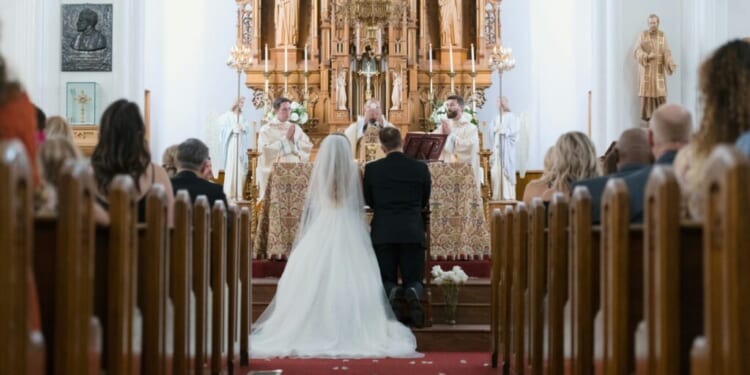One of the common questions young men are asking today is, “is marriage worth it?” There are countless articles and videos all across the internet arguing that it’s not (or at the very least, that tremendous caution should be taken before entering into it).
This isn’t the place for thoroughly contextualizing some of the statistics regarding happiness, fulfillment, infidelity, and divorce. This is partly because this has already been done elsewhere, but also because the statistics can only say so much. Sure, they have their role, and when placed alongside the mountain of tragic stories of failed marriages and terrible spouses, the case for marriage looks pretty bleak.
But even granting all of these, any young man must remember that he is more than a data point, as is his future wife if he decides to marry. He can take very simple and clear steps to reduce the risks portrayed by the statistics. Although one study implies that about 40% of first marriages today will end in divorce, it doesn’t follow that he will have a 40% chance of getting divorced. For one, if he is Catholic and marries another Catholic, the chance drops to 27%.
There’s also the mindset component. If you approach anything with the expectation that it will fail, it probably will. According to Brad Wilcox of the National Marriage Project, if you and your spouse have an “all-in” mindset and don’t see divorce as an option, not only are you less likely to get divorced, but you’re more likely to have a flourishing marriage. Simply approaching marriage from a Catholic perspective is one of countless ways to improve your chances of a happy marriage.
But this is all still giving too much weight to the statistics. Getting married is about promising a lifetime of complete self-giving to someone you love who also loves you in return. At this point, if it is true love and not just infatuation, it ceases to be about your own desire for marriage and entirely about the good of the other. It would be wrong to marry someone solely because you want to get married. You marry someone not because you want to “be married” in the abstract, but because you want to be joined together to that person in the indissoluble sacrament of matrimony as an actual and objective “we.” Dietrich von Hildebrand points out that marriage is an I-thou relationship, which means that from each spouse’s perspective, the focus is not on both of you together, but the other person.
St. John Chrysostom advises that because marriage is indissoluble, a tremendous amount of discernment should be taken when choosing who to marry. Once the choice is made, there is no going back. What does he say we should do if a man marries an unfaithful and immoral woman? He says he must love her and forgive her, because he looks to Christ as the model to imitate. Our Lord gave Himself up for His bride, the Church, despite her being impure. He says the husband must even be willing to die for her, regardless of her character, because that is what Christ did. This is what it means to be a husband. If a man has a loving and virtuous wife whom he loves dearly, there is no doubt he would give himself up for her. But even if his wife is unfaithful, he cannot simply divorce her and remarry.
There are cases of men eagerly giving up everything for their wives and being far happier than those who are more free and independent, and there are also cases of men who have lost everything to a bad marriage, including their own children, who now envy those who chose the single life. This is why discernment is vital. Proper discernment not only means keeping an eye out for the other’s red flags, but looking inward at our own feelings as well. Are we feeling true love for the other, or just infatuation? Are we settling for the other person out of a desire to “be married” in the abstract? Have we already discussed the really important questions about married life to make sure we’re on the same page? Are we subconsciously ignoring obvious red flags?
This is where good parents become so important. The advice of happily married parents can and should carry significant weight in helping their children discern whether someone is “marriage material.” If they’re not available, the advice of happily married friends can help as well. Someone looking in from the outside can spot clear red flags much better than the couple.
But even after proper discernment, there is always some level of risk, and that’s fine. Everything in life has risks. After doing everything we can, we can only leave the rest in God’s hands and pray for everything. Pray for proper discernment, pray for a happy marriage, and pray for virtue. All marriages, including happy ones, involve taking up the cross and suffering. We cannot forget that bad marriages are still an opportunity for the pursuit of holiness.
All of this to say that a decent portion of the discussion on marriage being “worth it” seems to be coming at it from the wrong angle. Are you willing to devote your entire life to another person, as risky as that is? Have you taken the proper steps to discern whether this person is right for you? It’s impossible to do any kind of “cost-benefit” analysis with marriage, because that’s not what marriage is about. Happily married men aren’t married because it was a good financial investment, or because it provided them with more free time, or because someone else now does all the dull housework for them. A man gives himself entirely because marriage is far better.
Can a man be happy without marriage? Of course, as so many celibate priests demonstrate. But vows of celibacy are also considered a kind of spiritual marriage. It is also a vocation of complete self-giving, one made directly with God.
It’s rather similar to pursuing a life of holiness (especially considering the repeated comparisons by numerous popes and theologians between marriage and the bond between Christ and His Church). We can look at the great saints and see all the suffering and sacrifice they went through out of love for God. Martyrs gladly gave their own lives for Christ. In an earthly sense, they lost everything. Yes, they will then gain something infinitely greater in Heaven, but there’s still something missing with this understanding. I doubt martyrs, right before their deaths, were thinking “this will benefit me in the long run.” Instead, they were focused on God, giving their lives out of love for Him. It is God’s love for us that saved us.
Any discussion on the benefits of marriage without reference to love is severely lacking. A good husband who loves his wife will give everything he has for her. He would also gladly take risks for her. Marriage, then, is worth the risk. It is a hearth to love, a joyful cross, and a path to sanctity.
Photo by Josh Applegate on Unsplash













